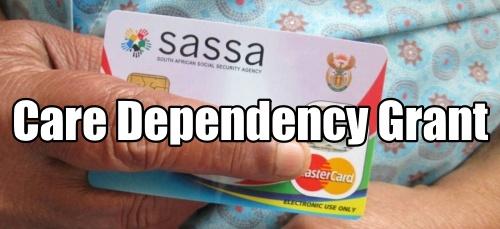SASSA Care Dependency Grant
The Care Dependency Grant (CGD) is a payment from the government of South Africa, to parents, foster parents, or primary care-giver of a child under the age of 18, who requires full-time care due to a mental or physical disability. The child must be receiving permanent home care and not be receiving care at a state-funded institution.

The value of the Care Dependency Grant is R2 190 per month, as of 1 October 2024. The next increase will be in April 2025.
If you would like to find out more about the Care Dependency Grant, carry on reading.
- What are the requirements to apply for the Care Dependency Grant?
- What is the Means Test for the Care Dependency Grant?
- How do I apply for the Care Dependency Grant?
- When will I receive the outcome of my Care Dependency Grant?
- How will I get paid my Care Dependency Grant?
- Why was my Care Dependency Grant application suspended
- Why did my Care Dependency Grant application lapse?
- How do I contact SASSA for any queries I have regarding my Care Dependency Grant application?
REQUIREMENTS FOR THE SASSA CARE DEPENDENCY GRANT
In order to apply for the SASSA Care Dependency Grant, it is important that you meet the criteria to apply (note that these criteria are subject to change). The criteria is as follows:
- You must be a South African Citizen, a Permanent Resident or a Refugee
- You must be a parent, a foster parent or a primary care-giver of a child under 18 years old
- The child must NOT be receiving permanent care in a state-funded institution
- You and the child must both reside within South Africa
- You must be able to prove that the child is severely disabled and is receiving permanent care or support services
- You and your spouse must meet the requirements of a means test – see the amount below (this does not apply to foster parents)
READ ABOUT: Other types of grants
SRD R350 Grant Care Dependency Grant Child Support Grant Foster Child Grant
Disability Grant Older Persons Grant Grant-In-Aid War Veterans Grant
MEANS TEST FOR THE SASSA CARE DEPENDENCY GRANT
SASSA awards social grants based on a means test. A means test is a method of evaluating an applicants income to determine whether they qualify for a grant.
To pass the means test, single applicants must not earn more than R250 800 a year, while married applicants must not earn more than a combined income of R501 600 a year (these are the thresholds as of 1 October 2023).
Applicants who are married will have half of the annual joint income taken into consideration.
Applicants who foster a Care Dependent child may be eligible to receive a Care Dependency Grant and a Child Grant for the same child (foster parents are not assessed by the means test).
APPLYING FOR THE SASSA CDG
To apply for the Care Dependency Grant, you should visit a SASSA office close to you or you may apply online (read instructions on how to apply online via the SASSA services website here).
If you are unable to visit the SASSA office yourself, due to being too sick, old or disabled, you may have a family member or friend apply for you, by way of a power of attorney. This person is your procurator and they will be able to legally apply or receive your social grant on your behalf.
The application form is available at the SASSA office and must be completed in the presence of a SASSA officer. A SASSA officer will be able to assist you or your appointed person, to complete the application form if you or they are unable to do so.
You will receive a dated stamped receipt, with the name of the SASSA official who assisted in the application. You will need to keep your receipt as proof of application.
The application process is completely FREE.
DOCUMENTS REQUIRED WHEN APPLYING FOR A CARE DEPENDENCY GRANT
Applicants must take along the following documents when applying for the care dependency grant through SASSA (these must be original documents or certified copies):
- The child’s ID Document or Birth Certificate (if this is not available, you may submit an affidavit to confirm personal information) (download the SASSA affidavit here)
- Yours and Your Spouses ID Documents (if either of you do not have ID documents, you may submit an affidavit to confirm your personal information (download the SASSA affidavit here)
- Proof of all household income – any of the following:
- Payslips if employed
- UIF card if receiving UIF
- Affidavit if unemployed
- Pension receipt if on pension
- Proof of any child maintenance or proof that you have tried but are unable to receive maintenance from the other biological parent
- Proof of your spousal relationship – any of the following:
- Marriage certificate: if married
- Divorce order: if divorced
- Spouses death certificate: if your spouse is deceased
- Sworn statement or affidavit if any of the above do not apply (eg. if you are living with a partner and unmarried, if you are separated or do not have contact with your spouse)
- Court order proving that you are the foster parent if applicable
- Affidavit from police/ affidavit from biological parent/ letter from the school/ social worker’s report, if you are the child’s primary caregiver but not the parent
- Sworn statement or affidavit stating yours and your spouses’ income if you are married
- Medical or assessment report from a doctor, to confirm that the child is severely disabled due to a physical or mental disability and therefore receives permanent care or support services
CARE DEPENDENCY GRANT OUTCOME
Applications are assessed within 30 business day, after which time you will be informed in writing, whether your application was approved or rejected. If you were rejected, SASSA will provide a reason for your rejection.
You will be able to request SASSA to reassess your application if it was rejected. Download the Application for Reconsideration of SASSA Grant here.
If after reconsidering, your application is still rejected, you may appeal to the Minister of Social Development.
Approved applicants will start receiving payments within 3 months of applying. SASSA will backdate payments to when you applied.
CARE DEPENDENCY GRANT PAYMENTS
After your grant is approved, you will be paid on the date on which you applied.
Your Care Dependency Grant will be paid in any of these 3 ways (depending on your preference):
- Directly into your bank account (this must be a bank account in your name)
- Collected in cash from approved pay points (using your SASSA gold card)
- From specific institutions
CHANGING GRANT PAYMENT METHOD
Recently, a Postbank payment glitch left many grant recipients stranded and unable to access their grants. For this reason (or perhaps another reason), you may wish to change your grant payment method from the SASSA Gold Card into your own personal bank account.
If you would like your grant to be paid into your bank account, you will need to complete the Consent Form for Bank Payment of SASSA Grant, as well as provide the following documents: proof of identity (ID document/ birth certificate/ drivers license) and proof of bank account in your name (received from the bank) or 3 months bank statement showing your personal details (name and bank account number).
All of these documents must be submitted to a SASSA office near you. Alternatively, you may visit your nearest SASSA branch and they will assist you in how to change your payment method. Note that the new payment method will come into effect the following month.
If you are unable to collect your grant yourself, you may nominate someone to collect it for you.
CARE DEPENDENCY GRANT REVIEWS
You must provide proof of all incomes you receive in your application.
Applications are reviewed to verify that grant-holders still meet the criteria of the grant, to continue receiving the grant. Applications are reviewed to assess whether your circumstances have changed.
Applicants will receive a notification in writing from SASSA, 3 months before applications are to be reviewed. The notification will inform you when and where the review will be conducted and what will happen after the review. Applicants who are bed-ridden will receive a home visit. After the review has been completed, you will receive a receipt of compliance.
Applicants who are refugees will have their application reviewed when their refugee status expires.
SUSPENSION OF THE GRANT
Your grant may be suspended due to the following reasons:
- Your circumstances change – either financially or medically
- You provided false or incorrect information in your application
- You failed to co-operate when the grant is reviewed
- Outcome of a review
- The grant was approved when it should not have been
RESTORATION OF THE GRANT
If your grant was suspended due to any of the reasons above, you may apply to have the grant restored within 90 days of receiving the suspension.
CARE DEPENDENCY GRANT LAPSE
Your grant may lapse due to the following reasons:
- The care dependent child has reached 18 years of age – the grant will lapse on the last day of the month in which they turned 18 (the child may be able to qualify for a disability grant after turning 18)
- The care dependent child has died – the grant will lapse on the last day of the month in which they died
- The care dependent child was admitted into a state-funded institution – the grant will lapse on the first day of the seventh month after the date they were admitted
- The care dependent child or you are no longer a refugee
CARE DEPENDENCY GRANT NOTES
As a grant holder, it is your responsibility to:
- keep SASSA updated with regards to changes to your personal and financial circumstances
- keep SASSA updated with regards to changes to your physical address or contact details
Applicants must inform SASSA immediately of any changes to the above, as official notices are sent to your most recent address by registered mail. If you do not receive or act upon the notices, your grant may be suspended.
SASSA will not tolerate any fraudulent activities.
CONTACT SASSA
For any further queries, please contact SASSA directly:
Contact the SASSA Toll Free Call centre on: 0800 60 10 11
Contact the SASSA Head Office on: 012 400 2322
Email SASSA Head Office at: Grantsenquiries@sassa.gov.za
Contact details of SASSA offices across the country: SASSA offices
